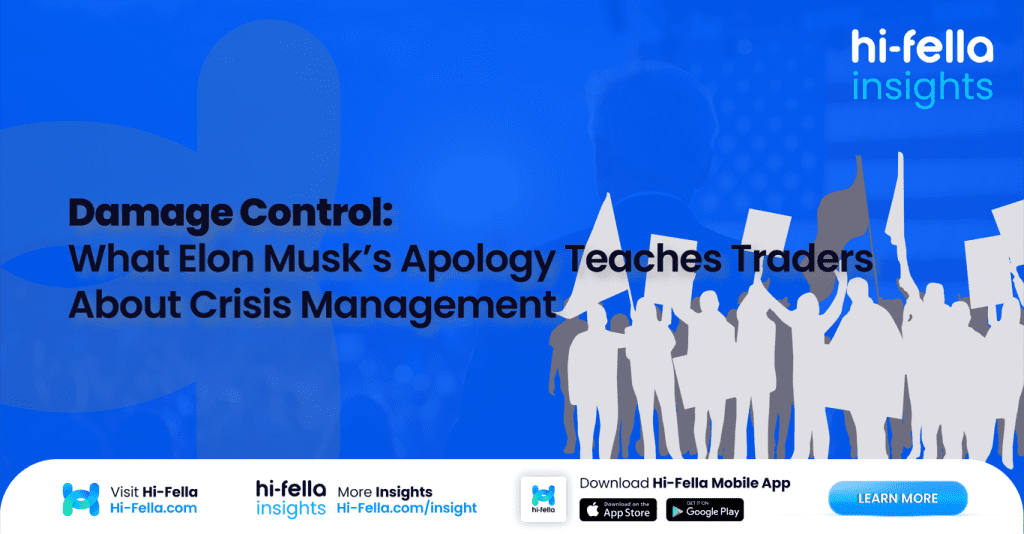In high-stakes markets, words matter—especially when they come from the world’s most influential CEOs. Elon Musk, known for his bold innovations and unpredictable online presence, has repeatedly demonstrated how a single public statement can shake investor confidence or spark price surges. But beyond headlines, his apologies serve as strategic damage control efforts and offer real-time lessons in reputation management—and market psychology.
At a time when financial ecosystems are increasingly sensitive to executive behavior, traders and operators need more than market data. They need insight, timing, and trusted global partnerships. Hi-Fella offers that foundation—helping you stay grounded amid uncertainty while navigating opportunity with clarity.
The Anatomy of Damage Control in a Market-Impacting Apology
When a CEO apologizes, it’s not just a PR moment—it’s a market event. Elon Musk’s apologies—whether for tweeting Tesla private at $420, criticizing regulators, or mocking industry norms—have triggered everything from stock selloffs to rebounds.
A high-profile apology contains four key elements:
- Timing: Immediate responses help limit damage. Delays fuel speculation.
- Tone: Humility and accountability typically restore confidence faster than defensiveness.
- Platform: Apologies on Twitter hit fast. Press releases lend formality. Earnings calls provide reassurance.
- Follow-through: Investors look for behavioral shifts post-apology to validate sincerity.
For traders, understanding this anatomy is critical. An early read on an apology’s tone and intent can shape intraday positioning, option strategies, or long-term exposure.
Market Sentiment and Volatility in the Wake of Public Statements
Words from executives like Musk often move faster than fundamentals. After the 2018 “funding secured” tweet, Tesla shares dropped nearly 11%, followed by sharp legal scrutiny. Yet Musk’s carefully worded apology and compliance agreement helped the stock recover within weeks.
Tools such as:
VIX (Volatility Index)
The Volatility Index, often referred to as the “fear gauge,” measures market expectations of short-term volatility. When a public statement by a high-profile executive triggers market uncertainty, the VIX often reacts even before official financial indicators do.
Investors and traders use the VIX as an early-warning system. Spikes in this index suggest rising nervousness, often preceding swings in stock prices or a surge in hedging activity—especially when statements are ambiguous or legally sensitive.
Google Trends (Search Spikes for “Musk Apology”, “Tesla Crisis”)
Google Trends reflects real-time public interest based on search volume. When events like the “funding secured” tweet unfold, sudden spikes in searches for phrases like “Musk apology” or “Tesla crisis” can indicate rising public concern or curiosity.
These search spikes often precede shifts in retail investor behavior or media coverage. By monitoring search trends, analysts can anticipate how news might evolve—and whether a brand’s response is quelling or fueling public sentiment.
Twitter Sentiment Analysis
Twitter sentiment tools analyze user reactions to specific events, using language processing to determine whether tweets are positive, negative, or neutral. During market turbulence, this provides a rapid pulse-check on investor psychology.
Traders monitor Twitter not just for volume, but for tone. A well-received executive apology, for example, might help stabilize a stock; whereas backlash, sarcasm, or hashtags trending negatively can accelerate selling pressure before traditional media catches up.
Those tools allow traders to gauge mood in near real time. In many cases, volume spikes and options premiums begin moving before official news lands—driven by how traders perceive the apology’s credibility.
This market behavior creates both risk and opportunity. Understanding apology impact can give traders a tactical edge in volatile environments.
Crisis Management Principles Traders Can Borrow from Corporate Playbooks
Traders can learn much from how corporations prepare for reputational risk. In the boardroom, crisis management relies on:
Reputation Hedging
In the corporate world, companies engage in scenario planning to prepare for reputational fallout. This might involve media simulations, legal contingencies, or public statements pre-approved for crisis use. The idea is to protect brand value even before a scandal hits.
Traders mirror this mindset through financial instruments like protective puts or inverse ETFs. These tools serve as reputational hedges—financial cushions that offset losses during times of public backlash or executive missteps.
Rapid Response Teams
Corporations often form dedicated rapid response teams comprising legal, communication, and PR leads. Their job is to respond within hours—not days—to emerging reputational threats, ensuring a coordinated and consistent message across all platforms.
Traders can adopt a similar approach with pre-set rebalancing rules. By defining specific triggers and corresponding actions in advance, they can move quickly when public sentiment turns, minimizing downside while others are still reacting.
Stakeholder Signaling
In times of crisis, how a CEO communicates—especially in apologies—has ripple effects far beyond regulators. Tone, timing, and clarity can either rebuild trust or further erode it, particularly among institutional investors and board members.
Smart fund managers pay close attention to these signals. A well-delivered apology can stabilize investor confidence and influence buy/hold decisions. Traders who understand this dynamic can better anticipate sentiment shifts in the aftermath of public missteps.
The Cambridge Analytica scandal saw Facebook’s stock slide over 18%, followed by Mark Zuckerberg’s testimony. Though late, his apology—paired with privacy reforms—restored some investor faith.
Smart fund managers adjust not only for financials but for leadership integrity. Traders can do the same.
From Tweets to Trades — Navigating the Age of CEO-Driven Markets
We now live in CEO-centric markets. From “key man risk” to meme-stock rallies, the personalities of leaders like Musk, Zuckerberg, and SBF (pre-collapse) impact prices beyond what quarterly earnings suggest.
Platforms like Bloomberg and CNBC now dedicate coverage to executive tweets, not just macroeconomic data.
Here’s what this means for traders:
- Monitor CEO social activity like an earnings report
- Use sentiment tools to react faster than the market average
- Diversify around high-volatility personalities to hedge against sudden value swings
In this new era, social signals are market signals. Building strategies around them isn’t optional—it’s essential.
Join Hi-Fella Today!
Markets will always be volatile. Apologies will always come late—or land wrong. But your business doesn’t have to ride that wave unprepared.
Hi-Fella helps traders, fund managers, and operators build resilience by connecting with:
- Verified global suppliers and buyers
- Cross-border partners and deal-makers
- Market players who prioritize consistency and trust
Whether you’re hedging geopolitical shifts or navigating the fallout from a CEO tweetstorm, Hi-Fella provides the reliable trade ecosystem you need to thrive.
Join Hi-Fella today to source, trade, and grow—confidently, even in crisis.








